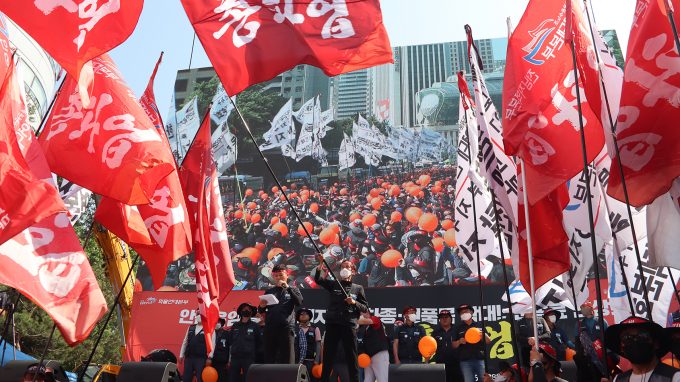China's extended military drills and invasion threat dampens Taiwan trade
China’s ‘war games’ in the Taiwan Strait will affect South Korea’s trade with Taiwan, says the ...

The South Korean government has refused to bargain with striking truckers, beginning the second week of the dispute, after a second round of negotiations collapsed today.
President Yoon Suk-Yeol’s government is standing firm on its position of refusing the Cargo Solidarity Truckers Union demand to make the Safe Trucking Freight Rates System permanent, and has even threatened to issue more executive orders forcing truckers in other segments to resume work.
Daily economic losses of $224m are estimated as a consequence of the ...
Keep our news independent, by supporting The Loadstar
Volume surge and an early peak season? 'Don't celebrate too soon,' warning
Container spot rates diverge: to Europe still falling, but firmer to the US
Hapag-Lloyd won't take bookings if port congestion leaves cargo stranded
Ecommerce likely the front-runner in resurge of transpacific trade after deal
China-US trade tariff pause could drive a rebound for transpacific rates
Shippers should check out the 'small print' in China-US tariff cuts
Service chaos from trade ban with India a problem for Pakistan shippers
Carriers impose 'emergency operation' surcharges on Pakistan cargo
Airfreight rates ex-China 'loss-making', but hopes of a trade deal stay high
Serious threat to jobs in US logistics as tariffs cause economic 'stagflation'
15% rebate for box ships as Suez Canal Authority woos carriers
White House u-turns see freighters flying but keep logistics players on their toes
MSC in terminal switch as Nhava Sheva gets strong start to new fiscal year
Peak season or recession? Forwarders and shippers need to 'stay flexible'
Volga-Dnepr claims 'pirate' Canada has 'hijacked' its stranded aircraft

Comment on this article